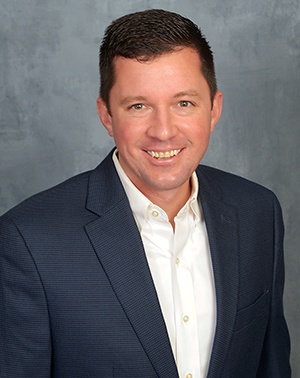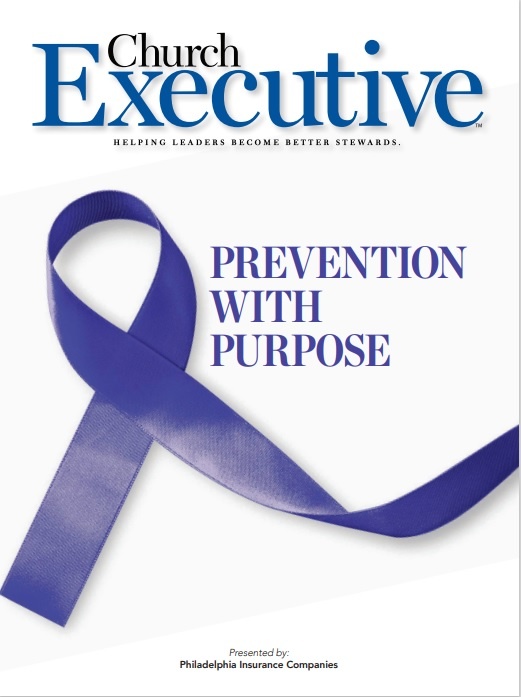
National Child Abuse Prevention Month is upon us. Commemorate it by brushing up on some basics — and taking impactful action in your own church to protect children.

Vice President
Philadelphia Insurance Companies (PHLY)
Church Executive: As insurers, what kind of an increase in child sexual abuse claims have you seen among churches in recent years?
Andrew Shockey: It was highly infrequent going back 15, maybe 20 years. But now it’s definitely something that we’re seeing more regularly, and I think that’s a function of societal awareness along with some of the continued changes and developments in the legislative environment. With statutes of limitations being eliminated, those windows have now been opened.
From our standpoint as insurers, we’re certainly about justice and care for victims. But as an industry, it’s also an incredibly challenging time.
CE: The prevalence of abuse claims in the house-of-worship realm probably seems counterintuitive to most people. Why churches?
Shockey: First, I think it’s the relationships — based on trust — that are manipulated by predators. It’s an environment where you have an opportunity to say, ‘Well, I know that person well enough [to trust him or her]’ that continues to make churches a prime target.
Second, churches are usually operated by a small group of staff and volunteers who are overwhelmed and overworked. Predators who are looking to perpetrate their crime will go where the barriers are lowest.
CE: How prepared are churches, at-large, to mitigate child sexual abuse claims?
Shockey: I don’t want to sound crass or flippant, but it often depends on whether or not a church has already navigated an allegation. Those churches don’t need to be convinced of the need to mitigate the risk.
Otherwise, unfortunately, my observation continues to be that more can be done. When you factor in human distraction or the drain of a global pandemic, for example, I can assure you that mitigating child sexual abuse risk was just one of a number of critical topics put aside while churches just tried to keep the lights on.
As an industry, insurers know the pandemic didn’t deter sexual abuse; in fact, it might even have made it easier for predators. Again, people were distracted — but youth groups were still happening virtually, and online is very much an avenue where grooming can take place.
CE: What are churches most commonly “missing” in their approach to child sexual abuse prevention?

Shockey: They lack a dedicated person (or persons) who will really take hold of this issue and own it on behalf of the congregation. It takes just an ounce of coordination, but often that’s an ounce more than is already in place.
From there, insurers are better than ever at being able to support churches large and small with additional resources, even at reduced or — in our case — no additional cost.
At the end of the day, it’s the church that knows who’s interacting with its children; we don’t.
In 2023, society continues to demand better. You see this in the judgments against the Church but also against the Boy Scouts of America, which continues to be a fair context. That organization is selling its biggest assets — its land and buildings — to cover
its transgressions.
CE: What is PHLY doing to help its church clients better mitigate this risk? Is there a cost involved?
Shockey: Well, there is a cost involved, but Philadelphia Insurance Companies is willing to invest on behalf of our policyholders. That’s a decision we continue to make, and frankly, I think it’s probably our best investment.
We have a longstanding partnership with MinistrySafe based in Fort Worth, Texas. Between our experiences with policyholders and their expertise, it’s a huge benefit. Because of that history, the cost of this training and these resources is something Philadelphia Insurance absorbs entirely for our customers who carry sexual abuse and molestation coverage on their general liability. But even for non-policyholders, MinistrySafe is available on the market for a cost, and it’s well worth it.
I’m working with founders Gregory Love and Kimberlee Norris on some legislative things right now to better protect children. They’re some of the most rewarding calls I’ve made because, again, it’s worth the effort. At some point, I hope that one of us will be able to report to you about an important adjustment to the federal legislation.
Some of the resources we make available right now to customers are quite simple, including a basic policy and procedure. How does your church deal with social media, for example? Some churches barely have a website, but they do have vibrant youth groups — and most of those kids have cell phones.
Certainly, that’s the start: an agreement about what is and isn’t permitted at the church for the safety of the children — and also, frankly, for staff and volunteers.
From there, it’s reinforced by training, which I’m really excited about. What is grooming? What are grooming behaviors?
Then, of course, there’s the topic of reporting. Even though you might not be a ‘mandated reporter’ in your given state or in your position at the church, policy should dictate that you are. We’re not aiming to simply comply with legislative minimums.
There’s also training for those who are in hiring positions. On an application or reference check, what equates a high-risk response? When a church is desperate to fill a volunteer position, this can be an especially difficult question. Maybe a registered sex offender is welcome in the church, but whether he or she has access to the children’s wing is an entirely different story.
Finally, we know that sexual predators groom children’s parents or guardians. So we offer policies, procedures and training for these individuals, too.
We’re trying to be as complete as possible. And if we ever come up with another good resource, we’ll probably offer that, too. It’s that important.
CE: Is there a way for a church to communicate to parents that it’s taking these types of measures to protect the church’s children? Or is that a potentially sensitive conversation?
Shockey: Look, there’s a lot of delicate and difficult conversations that take place within the Church. I’m speaking as an insurance professional, but also as a parent of three children and a member of a church: I do think the church’s policies and procedures in this regard should be communicated to parents. That’s because parents themselves have a duty to adhere to them.
I’ve seen churches do this as simply as saying, ‘You’re a new family member to the church. Come with me to our children’s wing and I’ll give you a tour.’ Or ‘Here’s where your child will be spending his time at youth group.’ It can be formal or informal, but a copy of your child protection procedures should be provided. It’s simply a matter of asking family members to do their part in helping the church best protect and care for children.
Even if it feels like an uncomfortable conversation, the choice is an easy one. I’ve never met a parent who’s unwilling to endure a 15- or 20-minute discussion to better protect their child.
CE: As you know, April is National Child Abuse Prevention Month. Is PHLY doing anything in particular to commemorate this event for its church clients?
Shockey: First, we’ll continue to support our clients who are using our training resources, and they’re in the thousands.
Second, we’re continuing to reach out to our clients who have this exposure but have yet to engage with us on these resources. Our ‘bill’ with MinistrySafe goes up when we do this, but it’s worth it.
Beyond that, you can bet we’ll have communications and other efforts going on not only in April, but all year long as we process our renewals and new business submissions. Our goal is to help influence individuals to do better by their organizations and by those they serve.
CE: It’s really easy to miss something when we talk about sexual abuse awareness and prevention. Is there anything you want to add?
Shockey: For anyone reading this, sexual abuse awareness and prevention training is worth the time and the effort. Even if you have 10 other things to do right now at your church that seem so pressing, it’s well worth it to do a little bit more in this area, right now.
— Reporting by RaeAnn Slaybaugh


